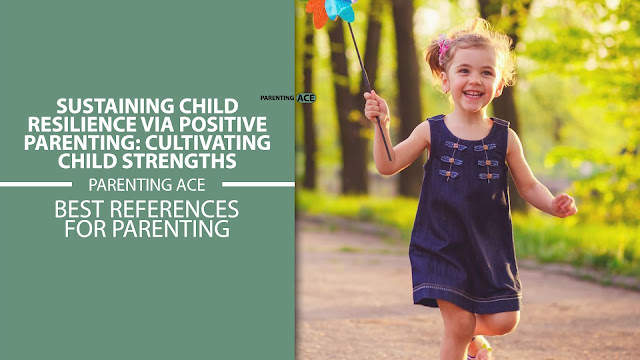Promoting Resilience Through Positive Parenting Practices: Nurturing Strength in Children
In the dynamic landscape of parenting, fostering resilience emerges as a paramount endeavor for nurturing children equipped to thrive amidst life's adversities. In this blog post, we delve into the profound significance of promoting resilience through positive parenting practices. Resilience, the ability to bounce back from challenges, is not innate but rather a skill honed through supportive environments and nurturing guidance. Exploring the pivotal role of parenting in shaping resilience, we uncover the transformative impact of positive parenting practices in cultivating children's inner strength, adaptability, and optimism. Join us on this journey as we unravel the essence of resilience promotion and its profound implications for nurturing resilient, capable individuals poised to flourish in an ever-evolving world.
 |
| Sustaining Child Resilience via Positive Parenting: Cultivating Child Strengths |
In the journey of parenting, one of the most crucial aspirations for parents is to equip their children with the ability to navigate life's challenges with resilience. Resilience, the capacity to bounce back from adversity, is not an innate trait but rather a skill that can be nurtured through positive parenting practices. In the realm of parenting's impact, fostering resilience holds profound significance, shaping children into resilient individuals capable of thriving despite life's inevitable hurdles.
Understanding Resilience
Resilience is more than just bouncing back from difficulties; it encompasses the ability to adapt, grow, and thrive in the face of adversity. Resilient individuals exhibit a sense of inner strength, optimism, and problem-solving skills that enable them to overcome setbacks and emerge stronger from life's trials. While genetics and temperament play a role in resilience, the environment, particularly the parenting style and practices, plays a pivotal role in its development.
Positive Parenting Practices
Positive parenting practices provide a nurturing environment that fosters resilience in children. These practices are rooted in warmth, empathy, and understanding, emphasizing the cultivation of strong parent-child bonds and the promotion of autonomy within safe boundaries. Here are some key positive parenting practices that promote resilience:
- Emotional Support: Providing emotional support involves validating children's feelings, empathizing with their struggles, and offering comfort and reassurance during difficult times. By acknowledging and addressing their emotions, parents help children develop emotional intelligence and coping mechanisms essential for resilience.
- Encouragement of Autonomy: Positive parenting encourages children to take on age-appropriate responsibilities and make decisions within a supportive framework. Allowing children to experience autonomy fosters a sense of competence and self-efficacy, essential components of resilience.
- Setting Realistic Expectations: Positive parenting involves setting realistic expectations for children while recognizing and celebrating their individual strengths and progress. By avoiding excessive pressure and fostering a growth mindset, parents empower children to persevere through challenges and setbacks.
- Promotion of Problem-Solving Skills: Teaching children problem-solving skills equips them with the tools to effectively manage obstacles and setbacks. Encouraging children to brainstorm solutions, evaluate outcomes, and learn from mistakes cultivates resilience by instilling a proactive approach to adversity.
- Modeling Resilient Behavior: Parents serve as powerful role models for their children. Modeling resilience through one's own behavior, demonstrating resilience in the face of challenges, and openly discussing coping strategies can inspire and empower children to develop their resilience skills.
The Impact of Parenting on Resilience
Positive parenting practices have a profound impact on children's development of resilience. Research consistently demonstrates that children raised in nurturing, supportive environments characterized by positive parenting practices are more likely to develop resilience and thrive in the face of adversity. By fostering resilience, parents equip children with essential life skills that contribute to their overall well-being, success, and fulfillment in life.
In the intricate tapestry of parenting, promoting resilience through positive parenting practices emerges as a cornerstone for nurturing strong, capable, and resilient individuals. By cultivating emotional support, autonomy, realistic expectations, problem-solving skills, and modeling resilient behavior, parents lay the foundation for their children to navigate life's challenges with resilience, optimism, and strength. In embracing the role of resilience promoters, parents not only shape the trajectory of their children's lives but also empower them to thrive in an ever-changing world.



Comments
Post a Comment